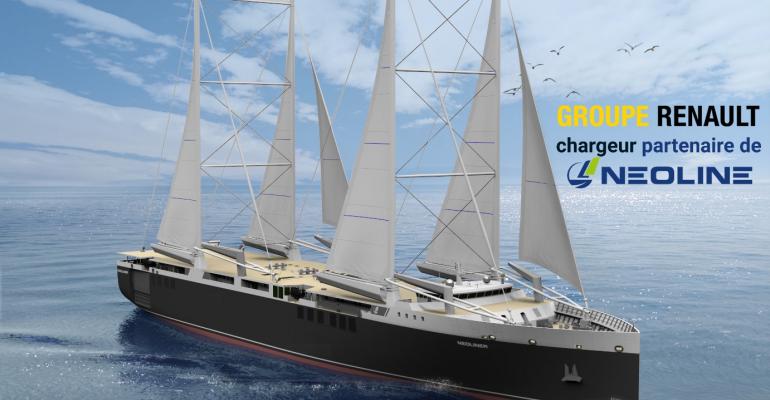Renault has entered in a three year partnership with Neoline with the aim of constructing two wind-powered vessels to serve routes between Saint-Nazaire, the eastern seaboard of the United States and Saint-Pierre & Miquelon.
The 478 car capacity vessels will have a speed of 11 knots powered by 4,200 sq m of sails and 4,200 kW auxiliary diesel-electric propulsion to give fully controlled transit times. Renault said the vessels would reduce carbon emissions by 90%.
Jean-Philippe Hermine, vice president, strategic environmental planning Groupe Renault, stated: “Groupe Renault’s objective is to reduce the environmental impact of each vehicle throughout its entire life cycle, from parts transportation up to delivery and end-of-life processing. In the context of our strategy to explore new sustainable mobility solutions and to continue along the road to reducing our carbon footprint, the solution designed by Neoline, which combines energy efficiency and operational relevance, has truly captured our attention”.
Read more: Wind power - Maersk tanker fitted with rotor sails
Jean Zanuttini, ceo of Neoline, said: “We are especially pleased that Groupe Renault, a key player in accessible and sustainable mobility for all, is the first partner to join us on board our journey by trusting in Neoline’s maritime transport solution. Considering that the traditional sea freight accounts for nearly 3% of CO2 emissions in Europe.”
The pilot vessels blend solutions from traditional maritime transport designs and competitive sailing.
The wind-powered vessels are one of a number of ways Renault is exploring to reduce its environmental footprint with an aim to reduce it by 6% between 2016 and 2022. Jean-François Salles, Renualt alliance global director, production control said: “We are also developing more initiatives, such as the use of natural gas transportation between parts suppliers and production sites, the evaluation of transporters’ environmental performance, the modernization of truck fleets, and of course the optimization of our flows to reduce the number of kilometers traveled and to eliminate empty trips”.
Copyright © 2024. All rights reserved. Seatrade, a trading name of Informa Markets (UK) Limited. Add Seatrade Maritime News to your Google News feed.


